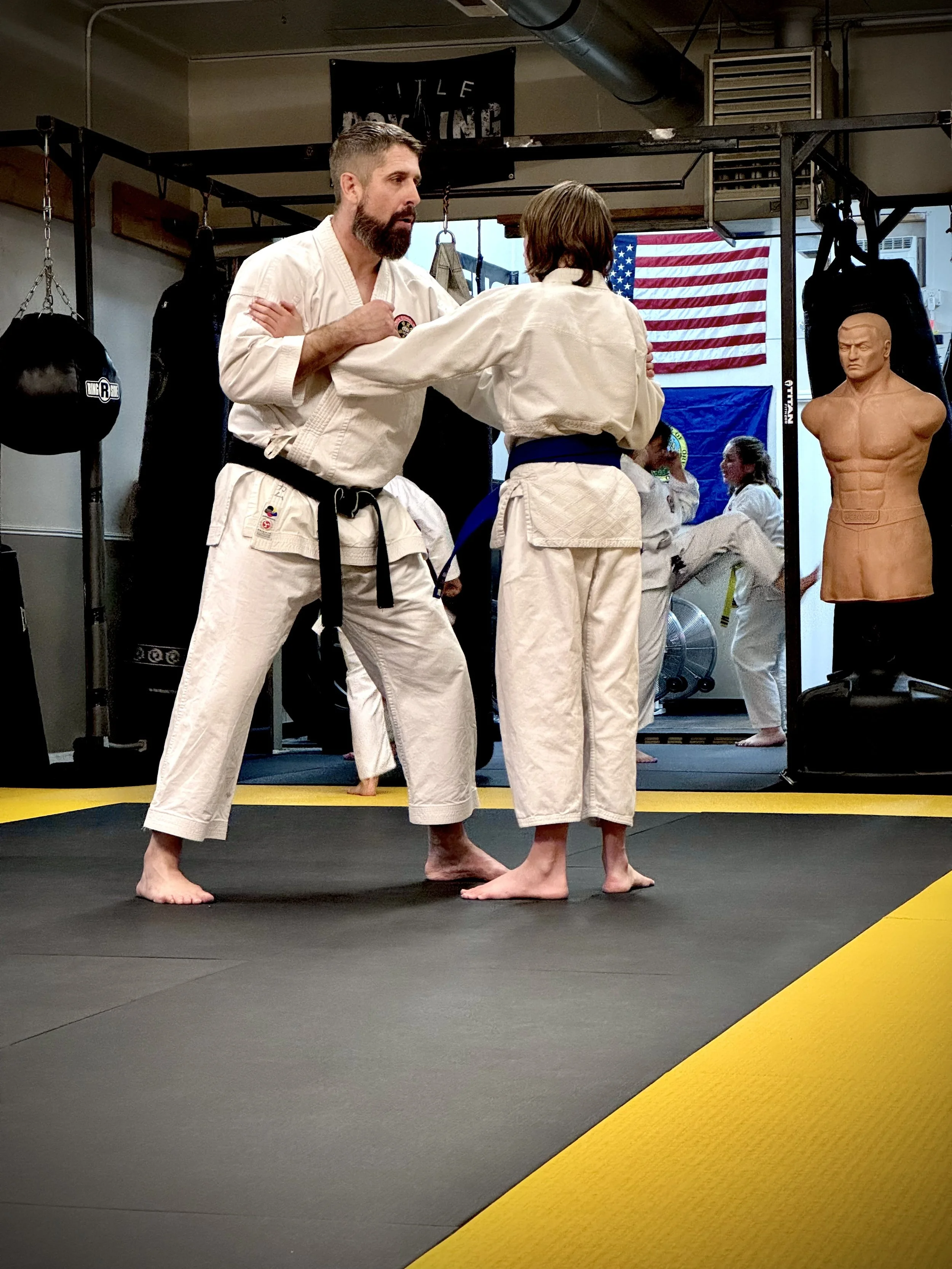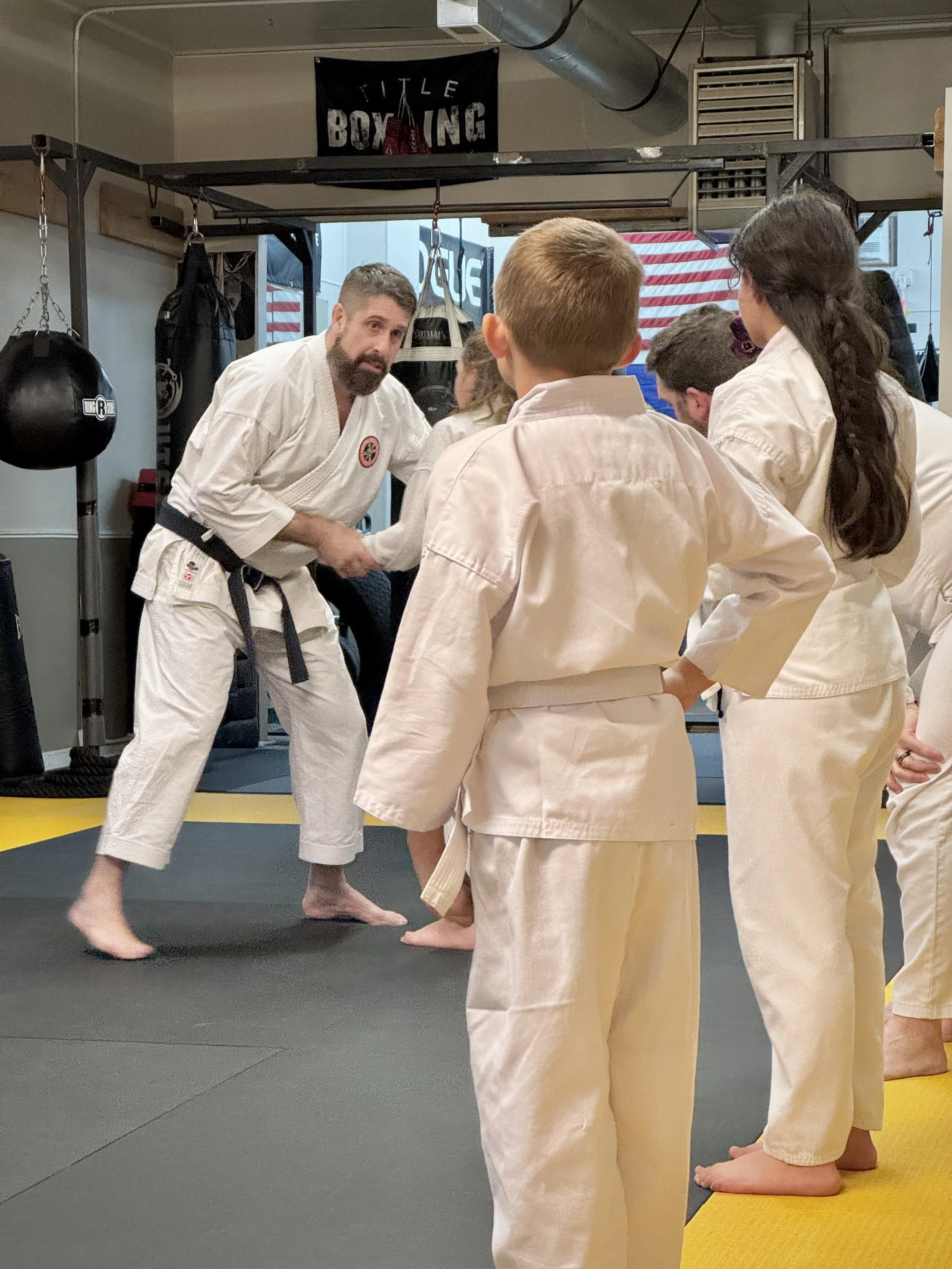Nampa School Of Karate
Kanken Toyama’s Okinawa Seitou Karate-Do, also known as ‘Shudokan’ in America, was originally developed by Kanken Toyama when he opened his first dojo in Tokyo on March 20th, 1930. When he established the school, it was called Shu Do Kan, which literally translates to “the hall for the study of the way of karate” or more figuratively translates to “an institution for cultivating the way.” Thus, its establishment was to discover a more natural and right way to live through the methods taught in karate.
While Shudokan is commonly accepted to be its own school of karate today, Toyama-san never claimed to have invented something new. He was originally a student of Ankō Itosu, the man famed to be responsible for the development of modern karate. Toyama-san always felt that what he taught was merely an extension of Itosu-san’s original form of karate. He once wrote on the topic that “the exquisite skill of karate that is based on self-protection does not need to contain several different ‘styles,’ but a combination of what works or is effective.” As a result of this position, Toyama-san never appointed a successor when he passed away in 1966, ultimately causing the school to take many new forms.
Today, Shudokan karate has developed into a school primarily made up of two systems. First, it includes Kobudo, which is the ‘ancient art’ Okinawan practice of special weapons. It also includes Shorin-ryu, which is known as one of the oldest schools of karate. Although Shudokan borrows much from these schools, there are also many others that it shares similarities with. It was always Kanken Toyama’s intention that Shudokan remain a dynamic school, and its constant variation on other techniques has fulfilled that original desire.
In the United States, the establishment of Shudokan Karate was largly managed by the American Shudokan Association (ASA), which is based in Yakima, WA. Currently, the ASA boasts over 15,000 members in the Pacific Northwest alone. The ASA was founded by Walter Todd and Morris Mack in the 1980s. Walter Todd was a student under Yoko Takahashi who was a direct student of Kanken Toyama. Later, Kanken Toyama appointed Walter Todd as Shibu-cho (Branch Director) for the U.S., authorizing him to rank students in Shudokan (Toyama-Style) karate and direct the development of Shudokan in America. The Nampa School of Karate began as an affiliate school of the ASA and was established in 2004 under Sensei Benjamin Kincheloe, who trained for decades with Hanshi Mack. Today, the school continues today under the leadership of Sensei Andrew Mecham, who began his training in 1993. Andrew received his first Black Belt in 1995 in Shito-Ryu while living in Eastern Idaho. He received his Dan Grade in Shudokan in 2015 under Ben Kincheloe and Morris Mack.
Today, Nampa School of Karate is an affiliate of the Ishimugenkan - a closely knit Karate Association founded by Michael Killingstad, Shihan, Shichidan. Shihan Killingstad trained for many years as a direct student of Ichikawa Isao, Hanshi. Ichikawa was a direct student of Toyama and was the founder of the Doshinkan. Michael has been consulted frequently by researchers on karate history and philosophy. We are privileged to have his guidance.
At Nampa School of Karate, Sensei Andy leads with a deep respect for the art’s roots, staying true to the original intent of karate as a powerful form of self-defense. While modern karate can often be watered down into point-based competition or sport, our dojo remains focused on teaching practical techniques that work in real-world scenarios. Sensei Andy emphasizes that karate is not just about scoring points or performing flashy moves, but about developing the confidence and skills needed to protect oneself.
For years, the dojo has been a staple in Nampa, a place where students of all ages come to learn an authentic, no-nonsense form of martial arts. With a curriculum rooted in traditional karate and adapted for modern self-defense, we ensure that every technique taught here has practical application beyond the mats.
Classes are offered on Tuesdays and Thursdays from 6:00 PM to 7:30 PM, and Saturdays at 1:00 PM. Whether you're looking to sharpen your self-defense skills or deepen your understanding of karate's true purpose, Nampa School of Karate offers a place to grow in both body and mind.
Ages 8+ Welcome-
Call Andy 208-284-2782
https://www.nampakarate.com/page/home



